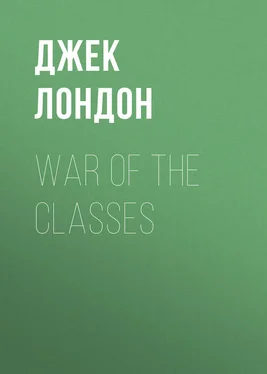Джек Лондон - War of the Classes
Здесь есть возможность читать онлайн «Джек Лондон - War of the Classes» — ознакомительный отрывок электронной книги совершенно бесплатно, а после прочтения отрывка купить полную версию. В некоторых случаях можно слушать аудио, скачать через торрент в формате fb2 и присутствует краткое содержание. Жанр: foreign_antique, foreign_prose, на английском языке. Описание произведения, (предисловие) а так же отзывы посетителей доступны на портале библиотеки ЛибКат.
- Название:War of the Classes
- Автор:
- Жанр:
- Год:неизвестен
- ISBN:нет данных
- Рейтинг книги:5 / 5. Голосов: 1
-
Избранное:Добавить в избранное
- Отзывы:
-
Ваша оценка:
- 100
- 1
- 2
- 3
- 4
- 5
War of the Classes: краткое содержание, описание и аннотация
Предлагаем к чтению аннотацию, описание, краткое содержание или предисловие (зависит от того, что написал сам автор книги «War of the Classes»). Если вы не нашли необходимую информацию о книге — напишите в комментариях, мы постараемся отыскать её.
War of the Classes — читать онлайн ознакомительный отрывок
Ниже представлен текст книги, разбитый по страницам. Система сохранения места последней прочитанной страницы, позволяет с удобством читать онлайн бесплатно книгу «War of the Classes», без необходимости каждый раз заново искать на чём Вы остановились. Поставьте закладку, и сможете в любой момент перейти на страницу, на которой закончили чтение.
Интервал:
Закладка:
On the other hand, the capitalist class is beginning to grow conscious of itself and of the struggle which is being waged. It is already forming offensive and defensive leagues, while some of the most prominent figures in the nation are preparing to lead it in the attack upon socialism.
The question to be solved is not one of Malthusianism, “projected efficiency,” nor ethics. It is a question of might. Whichever class is to win, will win by virtue of superior strength; for the workers are beginning to say, as they said to Mr. Cunniff, “Malthus be damned.” In their own minds they find no sanction for continuing the individual struggle for the survival of the fittest. As Mr. Gompers has said, they want more, and more, and more. The ethical import of Mr. Kidd’s plan of the present generation putting up with less in order that race efficiency may be projected into a remote future, has no bearing upon their actions. They refuse to be the “glad perishers” so glowingly described by Nietzsche.
It remains to be seen how promptly the capitalist class will respond to the call to arms. Upon its promptness rests its existence, for if it sits idly by, soothfully proclaiming that what ought not to be cannot be, it will find the roof beams crashing about its head. The capitalist class is in the numerical minority, and bids fair to be outvoted if it does not put a stop to the vast propaganda being waged by its enemy. It is no longer a question of whether or not there is a class struggle. The question now is, what will be the outcome of the class struggle?
THE TRAMP
Mr. Francis O’Neil, General Superintendent of Police, Chicago, speaking of the tramp, says: “Despite the most stringent police regulations, a great city will have a certain number of homeless vagrants to shelter through the winter.” “Despite,” – mark the word, a confession of organized helplessness as against unorganized necessity. If police regulations are stringent and yet fail, then that which makes them fail, namely, the tramp, must have still more stringent reasons for succeeding. This being so, it should be of interest to inquire into these reasons, to attempt to discover why the nameless and homeless vagrant sets at naught the right arm of the corporate power of our great cities, why all that is weak and worthless is stronger than all that is strong and of value.
Mr. O’Neil is a man of wide experience on the subject of tramps. He may be called a specialist. As he says of himself: “As an old-time desk sergeant and police captain, I have had almost unlimited opportunity to study and analyze this class of floating population, which seeks the city in winter and scatters abroad through the country in the spring.” He then continues: “This experience reiterated the lesson that the vast majority of these wanderers are of the class with whom a life of vagrancy is a chosen means of living without work.” Not only is it to be inferred from this that there is a large class in society which lives without work, for Mr. O’Neil’s testimony further shows that this class is forced to live without work.
He says: “I have been astonished at the multitude of those who have unfortunately engaged in occupations which practically force them to become loafers for at least a third of the year. And it is from this class that the tramps are largely recruited. I recall a certain winter when it seemed to me that a large portion of the inhabitants of Chicago belonged to this army of unfortunates. I was stationed at a police station not far from where an ice harvest was ready for the cutters. The ice company advertised for helpers, and the very night this call appeared in the newspapers our station was packed with homeless men, who asked shelter in order to be at hand for the morning’s work. Every foot of floor space was given over to these lodgers and scores were still unaccommodated.”
And again: “And it must be confessed that the man who is willing to do honest labor for food and shelter is a rare specimen in this vast army of shabby and tattered wanderers who seek the warmth of the city with the coming of the first snow.” Taking into consideration the crowd of honest laborers that swamped Mr. O’Neil’s station-house on the way to the ice-cutting, it is patent, if all tramps were looking for honest labor instead of a small minority, that the honest laborers would have a far harder task finding something honest to do for food and shelter. If the opinion of the honest laborers who swamped Mr. O’Neil’s station-house were asked, one could rest confident that each and every man would express a preference for fewer honest laborers on the morrow when he asked the ice foreman for a job.
And, finally, Mr. O’Neil says: “The humane and generous treatment which this city has accorded the great army of homeless unfortunates has made it the victim of wholesale imposition, and this well-intended policy of kindness has resulted in making Chicago the winter Mecca of a vast and undesirable floating population.” That is to say, because of her kindness, Chicago had more than her fair share of tramps; because she was humane and generous she suffered whole-sale imposition. From this we must conclude that it does not do to be humane and generous to our fellow-men – when they are tramps. Mr. O’Neil is right, and that this is no sophism it is the intention of this article, among other things, to show.
In a general way we may draw the following inferences from the remarks of Mr. O’Neil: (1) The tramp is stronger than organized society and cannot be put down; (2) The tramp is “shabby,” “tattered,” “homeless,” “unfortunate”; (3) There is a “vast” number of tramps; (4) Very few tramps are willing to do honest work; (5) Those tramps who are willing to do honest work have to hunt very hard to find it; (6) The tramp is undesirable.
To this last let the contention be appended that the tramp is only personally undesirable; that he is negatively desirable; that the function he performs in society is a negative function; and that he is the by-product of economic necessity.
It is very easy to demonstrate that there are more men than there is work for men to do. For instance, what would happen tomorrow if one hundred thousand tramps should become suddenly inspired with an overmastering desire for work? It is a fair question. “Go to work” is preached to the tramp every day of his life. The judge on the bench, the pedestrian in the street, the housewife at the kitchen door, all unite in advising him to go to work. So what would happen tomorrow if one hundred thousand tramps acted upon this advice and strenuously and indomitably sought work? Why, by the end of the week one hundred thousand workers, their places taken by the tramps, would receive their time and be “hitting the road” for a job.
Конец ознакомительного фрагмента.
Текст предоставлен ООО «ЛитРес».
Прочитайте эту книгу целиком, купив полную легальную версию на ЛитРес.
Безопасно оплатить книгу можно банковской картой Visa, MasterCard, Maestro, со счета мобильного телефона, с платежного терминала, в салоне МТС или Связной, через PayPal, WebMoney, Яндекс.Деньги, QIWI Кошелек, бонусными картами или другим удобным Вам способом.
Интервал:
Закладка:
Похожие книги на «War of the Classes»
Представляем Вашему вниманию похожие книги на «War of the Classes» списком для выбора. Мы отобрали схожую по названию и смыслу литературу в надежде предоставить читателям больше вариантов отыскать новые, интересные, ещё непрочитанные произведения.
Обсуждение, отзывы о книге «War of the Classes» и просто собственные мнения читателей. Оставьте ваши комментарии, напишите, что Вы думаете о произведении, его смысле или главных героях. Укажите что конкретно понравилось, а что нет, и почему Вы так считаете.












